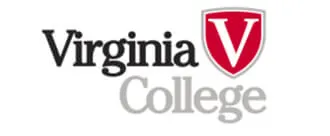Virginia College's Associate of Science in Surgical Technology program gives you the chance to prepare for a career assisting surgeons in operating rooms. Keep reading to learn more about the Associate of Science in Surgical Technology program at Virginia College.
<h2 id="section---FrequentlyAskedQuestions">Frequently Asked Questions</h2>
<h3 id="section---WhatKindOfProgramIsIt">What Kind of Program Is It?</h3>
<p>The Associate of Science in Surgical Technology program at Virginia College is campus-based and is offered at 14 of the school's campuses. After enrolling, you'll have the opportunity to learn about applying sterile surgical techniques, operating room technology, meeting OSHA specifications, ethics, and surgical instruments. Classes are intended to teach anatomy and physiology, medical terminology, patient care, microbiology, general and specialized surgical procedures, and pharmacology. You will also have a chance to get hands-on training through a surgical technologist externship.
</p>
<h3 id="section---WhatAreThePrerequisites">What Are the Prerequisites?</h3>
<p>Before enrolling in Virginia College's Associate of Science in Surgical Technology program, you should be interested in working in the medical field and dealing with patients. Applicants to Virginia College programs should have a high school diploma or GED.
</p>
<h3 id="section---WhatAreTheCourseRequirements">What Are the Course Requirements?</h3>
<p>The Associate of Science in Surgical Technology program at Virginia College is 96 credit hours. You'll take eight credits of foundation courses and 64 credits of concentration courses. In addition, you'll be required to complete 24 credits of general education courses in communications, humanities and fine arts, mathematics, and social and behavioral sciences.
</p>
<p><u>Foundation Courses</u>
</p>
<p />
<table border="1"><tr><th>Course Code</th><th>Course Name</th></tr>
<tr><td>EDU 1010</td><td> Learning Framework</td></tr>
<tr><td>EDU 1020</td><td> Career Exploration/Planning</td></tr>
</table><p><u>Concentration Courses</u>
</p>
<p />
<table border="1"><tr><th>Course Code</th><th>Course Name</th></tr>
<tr><td>BIO 1120</td><td> Anatomy and Physiology: Body Structures</td></tr>
<tr><td>BIO 1130</td><td> Anatomy and Physiology: Organs and Systems</td></tr>
<tr><td>MED 1010</td><td> Medical Terminology</td></tr>
<tr><td>MED 1140</td><td> Medical law and Ethics</td></tr>
<tr><td>MED 1210</td><td> Pathophysiology</td></tr>
<tr><td>SUR 1010</td><td> Aseptic Technique</td></tr>
<tr><td>SUR 1050</td><td> Patient Care for the Surgical Technologist</td></tr>
<tr><td>SUR 1500</td><td> Introduction to the Surgical Environment</td></tr>
<tr><td>SUR 1900</td><td> Microbiology for the Surgical Technologist</td></tr>
<tr><td>SUR 1960</td><td> Surgical Instrumentation and Equipment</td></tr>
<tr><td>SUR 2070</td><td> General and Specialized Surgical Procedures</td></tr>
<tr><td>SUR 2160</td><td> Specialty and Reconstructive Surgical Procedures</td></tr>
<tr><td>SUR 2170</td><td> Orthopaedic, Neurological, and Vascular Surgical Procedures</td></tr>
<tr><td>SUR 2190</td><td> Pharmacology for the Surgical Technologist</td></tr>
<tr><td>SUR 2600</td><td> Surgical Technologist Externship</td></tr>
</table><h3 id="section---WhatCouldIDoAfterIGraduate">What Could I Do After I Graduate?</h3>
<h4 id="section---CareerOpportunities">Career Opportunities</h4>
<p>Once you complete Virginia College's Associate of Science in Surgical Technology program, you might be able to pursue employment in the medical field assisting surgeons. You could also work with anesthesiologists, nurse anesthetists, and registered nurses. You might assist in delivering patient care. Jobs that you could be interested in include:
</p>
<ul><li>Operating room technician
</li><li>Surgical scrub technologist
</li><li>Surgical technician
</li><li>Surgical technologist
</li></ul><h4 id="section---AdvancedDegrees">Advanced Degrees</h4>
<p>You could be interested in continuing your studies by pursuing a bachelor's degree in the medical field, including surgical or medical technology, clinical laboratory science, or medical assisting. This might increase your knowledge of the assisting with and performing tests on patients while possibly preparing you for advancement in the medical field.
</p>
<p>Bachelor's degree options include but are not limited to:
</p>
<ul><li>Bachelor of Science in Clinical Laboratory Science
</li><li>Bachelor of Science in Medical Technology
</li><li>Bachelor in Medical Assisting
</li><li>Bachelor in Surgical Technology
</li></ul><p><i>Advanced degrees may not be offered at Virginia College, and credits may not be transferable.</i></p>



.svg)


